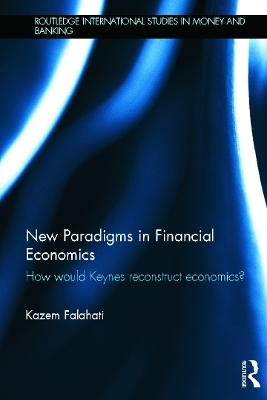
New Paradigms in Financial Economics
Routledge (Verlag)
978-0-415-63102-0 (ISBN)
The recent global financial crisis has made the inadequacies of the scientific state of economics and finance glaringly obvious, as these disciplines gave the false reassurance that such a self-destructive phenomenon could not happen. A similar phenomenon arose in the 1930’s, when the pitfalls of the dominant economic theories were sharply exposed. Since then, the same analytical framework, in its new versions, has revealed a huge number of other empirical and experimental failures.
On the other hand, the founders of the currently dominant theories in economics and finance (i.e. the standard paradigm) such as Walras (1834-1910), Modigliani (1918-2003) and Miller (1923-2000) have identified mathematical contradictions within their own foundational models, the root cause of which no one has yet discovered. The standard paradigm has thus lost the reason for its existence in the light of experience, experiments and logical rigour. This book identifies the heuristic cause of these external and internal contradictions of the standard paradigm and remedies these problems by offering a new paradigm which can explain and predict observed economic behaviour, and resolve the extant behavioural, empirical and experimental puzzles.
The new paradigm offers a dramatically improved understanding of economic behaviour at the micro as well as macro level of the economy within an over-arching framework comprising the real and the financial sectors. It does so in a rigorous but simple and clear way, using an axiomatic approach. It also offers policy recommendations on how the economy should be managed to avoid severe swings. It therefore is of great interest to scholars and practitioners in economics and finance.
Kazem Falahati is currently teaching International Financial Management at Glasgow Caledonian University, UK. He is an accountant-cum-economist by professional training. His experience includes senior managerial positions in both the financial and non-financial industries. He has advised major multinationals and financial institutions on their strategic investments and divestments as well as their financial structure, reporting and control with huge beneficial impact to their stakeholders.
1 Introduction; Chapter2 Irrational foundations of ‘rational’ behaviour in the standard paradigm; Chapter 3 Contradictions of the Marxian paradigm; Chapter 4 The new paradigm; Chapter 5 Resolution of puzzles in microeconomics; Chapter 6 Resolution of puzzles in finance; Chapter 7 Resolution of puzzles in macroeconomics; Chapter 8 Economic role of the State; Chapter 9 The recent global financial crisis; Chapter 10 Conclusion, policy and research recommendations
| Erscheint lt. Verlag | 26.10.2012 |
|---|---|
| Reihe/Serie | Routledge International Studies in Money and Banking |
| Zusatzinfo | 4 Tables, black and white; 22 Line drawings, black and white; 22 Illustrations, black and white |
| Verlagsort | London |
| Sprache | englisch |
| Maße | 156 x 234 mm |
| Gewicht | 570 g |
| Themenwelt | Wirtschaft ► Allgemeines / Lexika |
| Wirtschaft ► Betriebswirtschaft / Management ► Finanzierung | |
| Betriebswirtschaft / Management ► Spezielle Betriebswirtschaftslehre ► Bankbetriebslehre | |
| Wirtschaft ► Volkswirtschaftslehre ► Wirtschaftspolitik | |
| ISBN-10 | 0-415-63102-5 / 0415631025 |
| ISBN-13 | 978-0-415-63102-0 / 9780415631020 |
| Zustand | Neuware |
| Haben Sie eine Frage zum Produkt? |
aus dem Bereich


